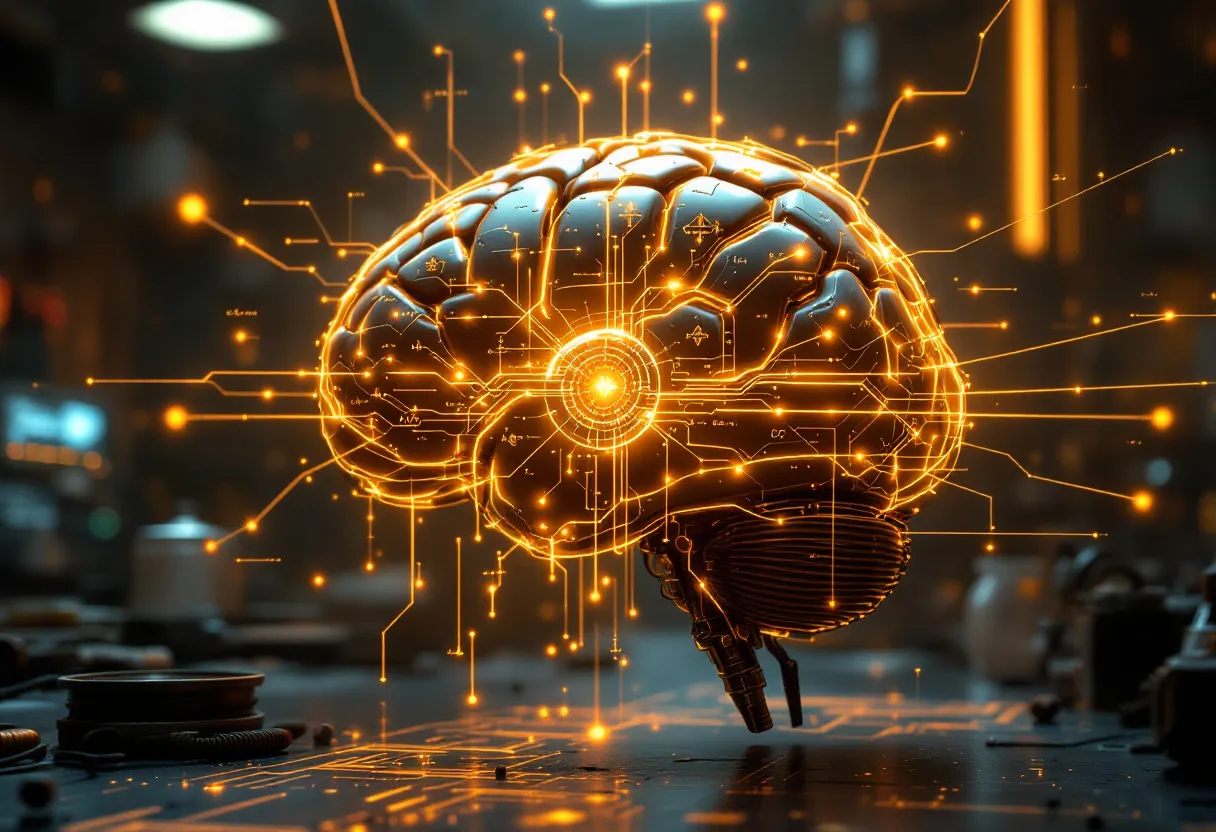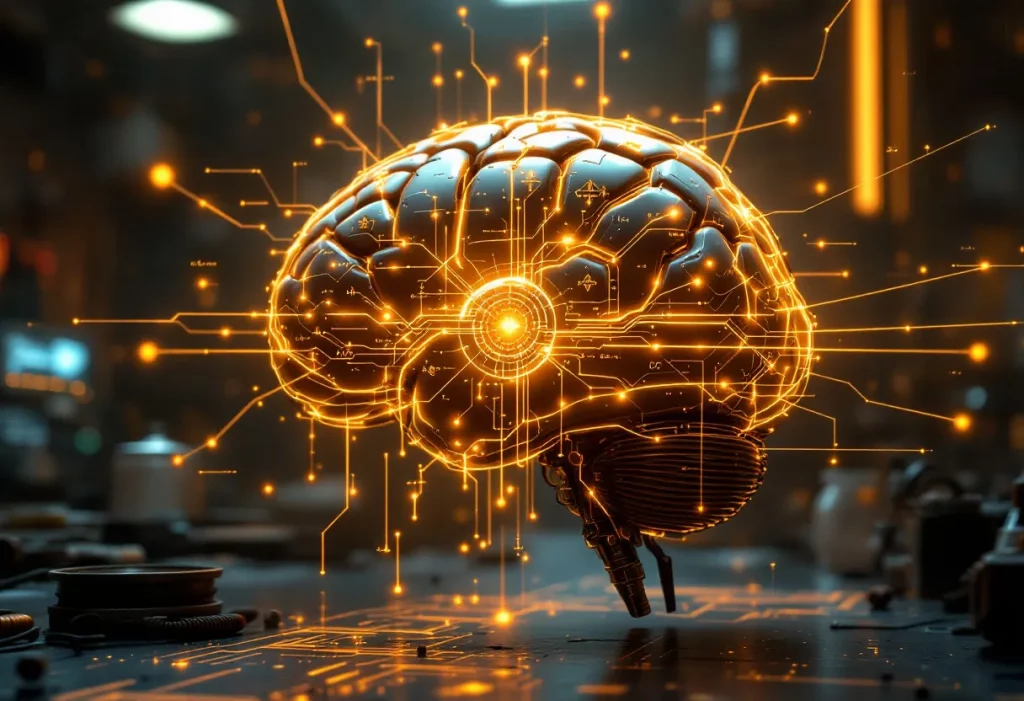
Artificial intelligence is no longer just progressing – it’s fundamentally redefining our society. In 2025, we will reach a decisive milestone where AI will become deeply integrated into every aspect of our daily lives and organizations. Discover the five major innovations that will shape this new technological era.

1. Autonomous AI agents: Your new virtual collaborators
The most striking development of 2025 will undoubtedly be the emergence of truly autonomous AI agents capable of acting as real collaborators rather than mere tools.
These intelligent assistants go far beyond the chatbot concept. They now orchestrate entire business processes, take initiative and interact naturally and multimodally with their environment. Their ability to understand context, learn continuously and adapt to unforeseen situations is fundamentally changing our relationship with technology.
“The AI agent of 2025 doesn’t just execute, it anticipates, advises and acts with discernment in a complex digital ecosystem.”
In the financial sector, these agents already manage investment portfolios autonomously. In logistics, they supervise the entire supply chain, anticipating disruptions and optimizing flows in real time.
To better understand how AI agents will transform your business in 2025, discover our comprehensive guide to AI agents and their impact on business.
2. Multimodal Intelligence: The end of cognitive silos
The second major trend concerns the rise of multimodal AI, which intelligently merges different sources of information (text, image, sound, video, structured data) for holistic understanding.
This development marks the end of AI systems specializing in a single domain. By 2025, multimodal models:
– Simultaneously analyze text documents, medical images and patient biometric data to offer diagnoses of unprecedented accuracy
– Understand the full context of a meeting by integrating facial expressions, tone of voice and presentation content
– Generate complete marketing campaigns including persuasive texts, tailored visuals and personalized deployment strategies
“The multimodal AI of 2025 perceives the world like a human: naturally integrating all sensory dimensions for rich, nuanced understanding.”
3. Advanced reasoning and generative AI: Augmented intelligence
The frontier models of 2025 display reasoning capabilities that rival human intelligence in ever broader domains. This third trend transforms AI into a true intellectual partner.
These systems no longer simply analyze or predict – they solve complex problems by generating creative, argumentative solutions. Their applications are revolutionizing many sectors:
– In software development, they design complete architectures and generate the corresponding code by integrating best practices
– In scientific research, they formulate original hypotheses and suggest innovative experimental protocols
– In strategic consulting, they draw up market evolution scenarios and recommendations adapted to each corporate context
If you want to harness this generative power to develop new revenue streams, consult our guide to creating passive income with AI in 2025.
4. Human-IA collaboration: the duo of excellence
Beyond initial fears of replacement, 2025 enshrines the advent of a productive synergy between humans and artificial intelligence. This fourth trend fundamentally redefines the organization of work.
The most successful companies are no longer seeking to pit humans and machines against each other, but to create hybrid teams where each brings its complementary strengths:
– AI excels in massive data analysis, precise execution and tireless automation
– Humans retain primacy in ethical thinking, emotional intelligence and disruptive creativity
“The organizations that thrive in 2025 are those that have orchestrated a fluid collaboration between human expertise and algorithmic capabilities, transcending their respective limitations.”
This collaboration redefines all professions: doctors diagnose with unparalleled precision, lawyers analyze thousands of precedents in a matter of seconds, creatives explore uncharted conceptual territory thanks to this augmented partnership.
5. Governance, ethics and impact measurement: Responsible AI
The fifth crucial trend of 2025 concerns the maturity of AI governance and evaluation practices. Faced with the massive deployment of these technologies, companies and institutions have developed rigorous frameworks to ensure ethical and measurable use.
Organizations are now adopting:
– Continuous model auditing systems to detect and correct algorithmic biases
– Explainability mechanisms to understand AI decisions and maintain human accountability
– Standardized impact measurement repositories accurately assessing the benefits and risks of each deployment
This trend responds to the growing demands of international regulations, such as the European AI Act, which impose strict standards of evaluation and transparency.
To intelligently automate your processes while complying with these standards, discover our guide to intelligent automation with AI agents in 2025.
A new technological and social paradigm
The year 2025 marks a decisive stage in our relationship with artificial intelligence. These five trends are converging to create a technological ecosystem of unprecedented richness and complexity.
Organizations that master these innovations – autonomous agents, multimodal intelligence, advanced reasoning, human-machine collaboration and ethical governance – will have a considerable competitive advantage.
Beyond efficiency gains, these technologies are reshaping our society, our interactions and our relationship to work. The AI of 2025 will no longer simply assist us – it will become an extension of our cognitive and creative capacities, opening up horizons we’ve only just begun to glimpse.
The question is no longer whether AI will transform our world, but how we will collectively direct this transformation to serve our shared fulfillment and prosperity.
FAQ
- What are the main advantages of autonomous AI agents?
- Autonomous AI agents can orchestrate end-to-end business processes, make contextual decisions without human intervention, collaborate with each other and adapt to dynamic environments.
- How is multimodal AI transforming healthcare, commerce and industry?
- Multimodal AI enables simultaneous analysis of text, images, sound, video and sensory data, transforming medical diagnostics, customer experiences and predictive monitoring.
- How does human-IA collaboration benefit business?
- Human-IA collaboration amplifies human cognitive abilities, automates routine tasks, offers alternative perspectives and adapts to individual user preferences, thereby increasing creativity and productivity.
- What are the characteristics of AIs with advanced reasoning capabilities?
- Reasoning AIs can formulate explicit reasoning chains, self-assess confidence in generated answers, detect biases and knowledge limitations, and reason causally.
- Why specialized cloud infrastructure is crucial for AI
- Specialized cloud infrastructure enables training and inference of ever more sophisticated AI models, thanks to optimized neural gas pedals, edge computing solutions and redesigned memory architectures.
- How can businesses benefit from autonomous AI agents
- Companies can use autonomous AI agents to automate complex processes, reduce operational costs and offer personalized services, thereby increasing productivity.
- What are the challenges of adopting multimodal AI?
- Challenges include the integration of heterogeneous data, processing costs and the need to manage massive data volumes.
- How can human-IA collaboration improve well-being at work
- Human-IA collaboration can reduce the workload associated with routine tasks, allowing employees to focus on more creative and strategic activities, improving well-being at work.
- Why is transparency important in reasoning AI systems?
- Transparency is crucial to establishing the trust of users and stakeholders, particularly in sensitive sectors such as medicine, finance or justice.
- What are the competitive advantages of specialized cloud infrastructures for AI?
- Specialized cloud infrastructures offer competitive advantages in terms of cost optimization, new technical capabilities and digital sovereignty.
Related Articles

Peter Steinberger Recruited by OpenAI: OpenClaw and the AI Agent Revolution
On February 14, 2026, Peter Steinberger officially announced his arrival at OpenAI. This 40-year-old Austrian developer is not a newcomer: he’s the creator of OpenClaw, the open source AI agent…

Genie 3: The world model that generates interactive 3D environments
Google DeepMind has just made a major breakthrough with Genie 3, its new generative world model. Forget about passive AI-generated videos—here, we’re talking about interactive 3D worlds created in real…
